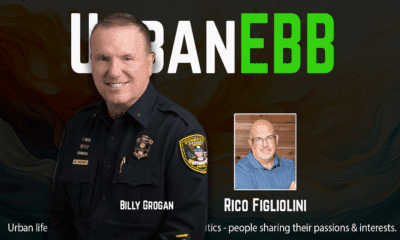Business
3 Things and More that Small Business Owners Should Focus on in 2022 [Podcast]
Published
3 years agoon
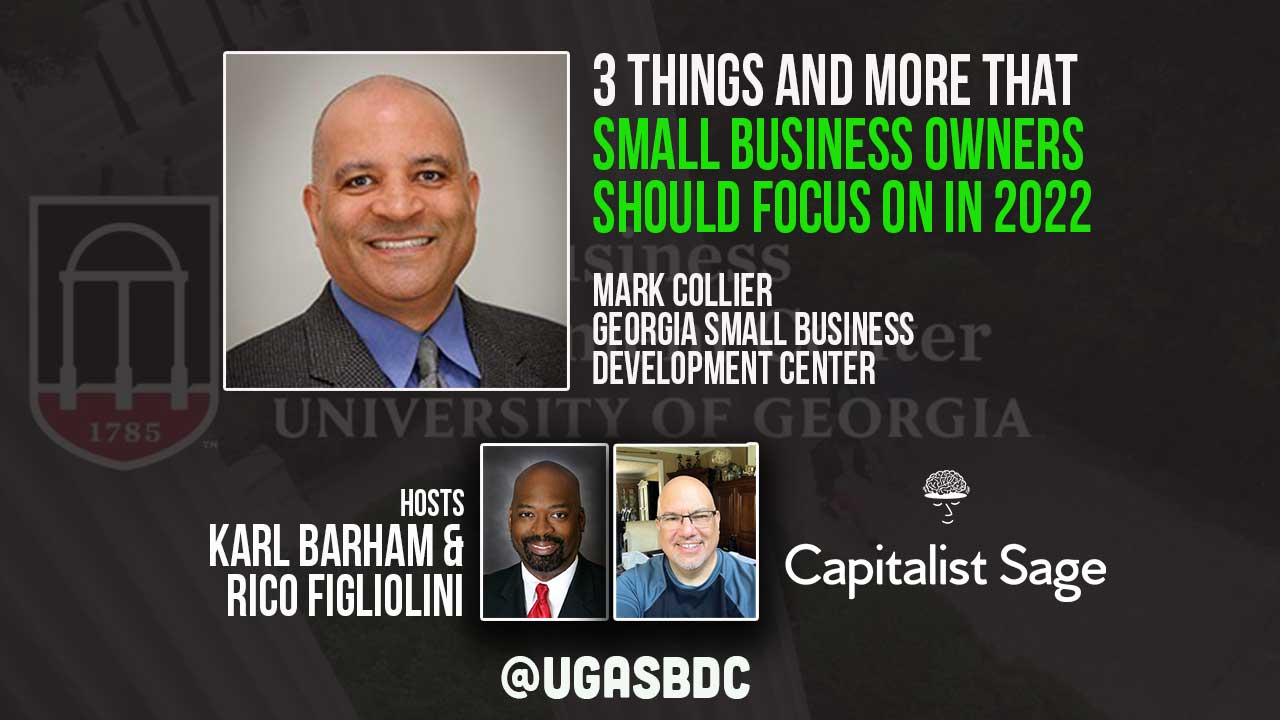
On this special episode of the Capitalist Sage, Karl and Rico are joined by Mark Collier, business consultant and faculty member with the University of Georgia Small Business Development Center. What is affectionately called the SBDC, is a great resource to the small business community. Listen in to this episode to learn more about the SBDC and just how this asset can help you build your business.
Resources:
SBDC Website: GeorgiaSBDC.org
Mark’s Email: MCollier@GeorgiaSBDC.org
SBDC DeKalb Number: (770) 414-3110
Timestamp:
[00:00:30] – Intro
[00:02:30] – About Mark and SBDC
[00:05:07] – Hiring and The Labor Crunch
[00:09:52] – The Importance of a Business Plan
[00:11:30] – Supply Chain and Strategizing
[00:13:34] – Finding Your Differentiating Factors
[00:17:01] – Getting Financial Systems and Plans in Place
[00:23:54] – Resources with SBDC
[00:27:36] – Closing
“We have a singular, sole mission and that’s to help Georgia businesses grow. That is all we do. We help businesses along all, what we call five core business functional areas. Strategic planning, marketing, operations, human resources, and financial reporting. So we’ve got a variety of tools and resources for small businesses.”
Mark Collier
Podcast Transcript
[00:00:30] Karl: Welcome to the Capitalist Sage Podcast. We’re here to bring you advice and tips from seasoned pros and experts to help you improve your business. I’m Karl Barham with Transworld Business Advisors of Atlanta Peachtree, and my co-host is Rico Figliolini with Mighty Rockets, Digital Marketing, and the publisher of the Peachtree Corners Magazine. Hey Rico, how you doing today?
[00:00:50] Rico: Good Karl, it’s a beautiful day.
[00:00:53] Karl: Yes, no snow this weekend. As we sit here in January, getting ready for our mini exposure to winter. Excited to continue to have some great shows today. Why don’t you introduce our sponsor for today?
[00:01:06] Rico: Sure. Our sponsor is Peachtree Corners Magazine. The sponsor of the family of podcasts that we do, right? Between this and the Peachtree Corners Life and Prime Lunchtime with the City Manager. So, and now we’re working on our next issue, which is the best of Reader’s Choice Awards for Peachtree Corners. That’ll be coming out the beginning of next month. So a lot of stuff in there and it’s going to be a good issue.
[00:01:28] Karl: I think a deadline is coming up for that. I know I went in and made some, when is the deadline for people to get their votes in?
[00:01:36] Rico: Today actually is the deadline. The 20th when we’re filming, when we’re streaming this and filming this rather. So yeah, we’ve had over 1800 responses so far, which is phenomenal, I think for this type of survey.
[00:01:49] Karl: Well, looking forward to see that. And again, a lot of the small businesses that are featured in that survey also, I’m glad to see the many businesses that the community here supports. So really appreciate that. Well, today I want to jump right in and I’m excited to welcome today’s guest is Mark Collier. He is the business consultant and faculty member with the University of Georgia Small Business Development Center. And if you don’t know, what we affectionately call the SBDC is, this is a time to learn a little bit about it and understand it’s great resource to the small business community. Hey Mark, how you doing today?
[00:02:27] Mark: I’m doing well. Karl, and Rico, thanks for having me on.
[00:02:30] Karl: We’re really excited to talk. Why don’t you introduce yourself a little bit to our audience. Tell us a little bit about yourself and what you do with the SBDC to help the small business community?
[00:02:40] Mark: Absolutely. Again, my name is Mark Collier. I’m a business consultant at the University of Georgia, Small Business Development Center. I office in the DeKalb office, one of 18 offices around the state. And we have a singular sole mission and that’s to help Georgia businesses grow. That is all we do. We help businesses along all, what we call five core business functional areas. Strategic planning, marketing, operations, human resources, and financial reporting. So we’ve got a variety of tools and resources for small businesses. And here’s the best thing Karl, anyone who chooses to use our services have already paid for us through the tax dollars that they pay. So our services come at no direct cost because we have one singular mission. And that is when we help Georgia businesses grow and scale, and they grow their revenue, grow their employees, guess what? They pay more taxes.
[00:03:35] Karl: That’s right.
[00:03:36] Mark: A very simple business model that we work off of.
[00:03:38] Karl: Well, I love it. And most people already know. And if you don’t, most of the businesses in the US, 90 plus percent are small businesses. So continuing to support that is a mission that the SBDC and the folks that help advise and support the small business community is really passionate about. Well, today I wanted to start off by talking about some of the top issues you see business owners struggling with. And some of the things that they can do about it. Why don’t we start with the first thing that when you talk to business owners, where do you see them really having challenges?
[00:04:12] Mark: Well, that has shifted over the last couple of years. Prior to the pandemic year of 2020, it was the traditional things. Access to capital, strategic planning and marketing. Since the pandemic their needs have shifted dramatically to how do I deal with this pandemic? How do I pivot in an effective manner to continue to drive revenue growth for my company? So that’s kind of the core challenge that we are seeing now is how can businesses best compete in our emerging post COVID economy.
[00:04:44] Karl: Yeah. We’re seeing a lot of that when we talk to business owners. It’s actually incredible to think that in 2021, what constrained most business owners from having a really stronger bounce back from COVID in 2021 was that they didn’t have the people and they were struggling with supply chain issues that would allow them to continue to grow their business.
[00:05:07] Mark: Correct.
[00:05:07] Karl: But I’m curious, have you seen techniques and strategies that business owners have been doing, to succeed to navigate? Let’s say start on if you’re a service business, the people part, and then we could talk a little bit about people that sell products in the supply chain area.
[00:05:23] Mark: Sure. Well, from the people perspective, there’s been a labor crunch. Across the board labor crunch in a lot of sectors. So what small business owners have had to do is really wrap up their offerings to attract and retain good people. Not only in terms of salary but a huge one, Karl that’s emerged since the pandemic is the ability to work from home or some type of hybrid arrangement where they can work partly in the office and partly at home. Businesses who are focused on wrapping up their benefits and pay, are the ones who have gained a competitive edge in keeping and finding and retaining good people for their company.
[00:06:04] Rico: Has it become a problem with some companies trying to up their salaries, up their hourly pay to be able to meet the demand? Has that helped employment at all?
[00:06:14] Mark: Well, it’s gonna cause some kind of wage inflation, which we’re starting to see some reminiscence of out here. But in terms of the difficulty, yes. Obviously anytime you raise a pay of your employees, that impacts your bottom line because your labor costs start to rise. And there’s only so, so far that you can rise the prices of your goods and services to help mitigate that.
[00:06:37] Rico: Right. And to pay more for new employees to attract them, you also have to lift the wage just to your existing employees too.
[00:06:43] Mark: Correct. Rico, what smart employers are doing is they’re trying to get folks away from focusing purely on the dollars and starting to offer some ancillary benefits. Like I said, perhaps a hybrid work environment. Some additional vacation days or other incentives that are non-monetary that wouldn’t have that direct impact to a company’s bottom line.
[00:07:04] Karl: I think the market and what this has done, it’s accelerated a trend that we saw in large corporations for probably 20 years. You know, you work for a large company like Coca-Cola or UPS, you get benefits and vacation and all these things. that drove retention. That’s why you have people that have worked there for 20 years and 30 years. It wasn’t always about just the salary, although they were competitive. Some of that expectation now is creeping into the small business environment. And I know a lot of small business owners pride themselves of how disposable their workers were. If you wanted more money, I could find someone else to do it. Well, when unemployments under 3% here in Georgia right now. It’s 2.8, 2.7 and continuing to decline. The recognition in 2022, is that the market has shifted.
[00:07:56] Mark: Yes.
[00:07:56] Karl: We’re announcing it here. We’re calling it out. You can continue the same practices pre pandemic, but what you’re risking is being able to hire, attract, retain the best quality employees in this environment. And if you don’t have the employees to service your customers, you can’t grow your revenue.
[00:08:16] Mark: No. Not only can you grow your revenue, but you’re putting your entire business livelihood at stake. You may go out of business.
[00:08:23] Karl: Absolutely. It is something that when we look at financials for folks and we see what they pay on leads and salary, we’re just expressing to them the need. Now we understand that it’s going to decrease profit. If you act alone in that way. Some of these other benefits can be something that’s lower cost to deliver, but you’ve also got to think about ways of adding more value to what you provide so you can increase prices. That’s when it’s forcing you to think holistically about your business model. And if labor is going up by 10, 20%, what else can shrink? And where else can you grow revenue to help maintain an increased profitability?
[00:09:01] Mark: No, I was going to say probably you’re spot on that the words value added has taken on a new meaning for small business owners that they’ve got to have that value add.
[00:09:09] Rico: I was just gonna point out that, I mean from my experience with advertisers and such and being out there with some of the small businesses in retail, is that if there’s not enough employees, you end up limiting the hours that you’re opened. You end up, the service suffers and people are funny. The Yelp reviews we’ll go flying. And in fact for every one bad Yelp review, there may be 10 people that are not even going to bother doing a review. They just won’t go back. So it’s not just saying I don’t have enough money to do this. It’s more like, is my business going to suffer? And I’m going to lose clients because of that. Because eventually you ended up closing.
[00:09:50] Mark: No, absolutely. Absolutely.
[00:09:52] Karl: So this leaded to an interesting discussion for business owners. If when you have business owners come into your office, I’m curious to how often they walk in and they open up and present you a business plan for the new year, 2022. Here, Mark, here’s my business plan. Here’s where I’m going to grow revenue. I’m going to diversify revenue stream, I’m going to offer catering in my business. I’m going to offer delivery. And then here’s my cost basis and here’s how much profit and here’s some of the things I’m doing strategically. That’s what you get when people come in every day, right?
[00:10:24] Mark: Oh, absolutely Karl. It’s routine, no. Absolutely not. Most folks who come in, and it really depends on what stage they’re in. If they’re a pre venture or startup, there’s a whole different set of needs that are very different than an established business or what we call professionally managed business. But you’re right. The majority of business owners come in, they do not have a business plan. And that’s something I strongly urge because a business plan serves as a blueprint for success. You can’t get to a destination if you don’t have a roadmap to get there. And that is what a business plan serves. It is a living breathing document that kind of drives the company’s culture, it drives the mission, drives the vision. It drives everything. And Karl, you mentioned something where they come in at the beginning of the year. But within that overarching business plan, there has to be a strategic plan that has to be a part of that business plan. But that’s something that has to be looked at least on a quarterly basis to make sure that you’re on track. And if any course corrections need to be made at that point.
[00:11:30] Karl: One great example around that, as we talked a little bit about the impact of supply chain. I was talking to a business owner the other day, you know, we started talking about some of the challenges that’s happening currently. And I ran into a business owner that did a really smart thing. They saw what was coming with the supply chain challenges and they placed orders for key materials months in advance. And so now they’re going into their peak season in the spring and they’ve got all the inventory they need for over a year of the business. So they did some tactics, but they saw it coming around the curve. When I talked to them some further, the next evolution is they’re looking at getting suppliers that are more domestically based versus overseas. All the way around it, they don’t know how long ports are going to be jammed up, but they realize they have to make a strategic shift in their supply base so they don’t have to keep ordering all that inventory in advance and dealing with that. How important is it to start talking to somebody through those things to be successful?
[00:12:35] Mark: I can guarantee you that client of yours had a strategic plan in place with some mitigating factors that helped them forecast those types of things. And typically those things are uncovered during your SWOT analysis, your strengths, weaknesses, opportunities, and threats. So you can start to make some adjustments when things happen and do some better forecasting. But your client also has understood the importance of supply chain diversification. Because the clogged supply chains, and there was a point early on in the pandemic where nobody even wanted anything from China. They didn’t know if it would come over infected with COVID. We didn’t know what extent that virus can infiltrate products. So we went through that stage where they didn’t want any products from China. And what that did is created a mini revolution of Made in America products. Which I think we’ll start to see the fruits of that as this year rolls on and on into 2023.
[00:13:33] Karl: Absolutely.
[00:13:34] Rico: Yeah. And I agree with you, Mark. Politically speaking, even if the supply chain fixes itself to a degree with the world politics, the way it is and the stresses that are going on in the South China Sea and all that stuff. I mean, most people are moving towards American products. There are international things going on that we can’t even fathom at this point. But Ukraine is an example, what’s going on right now. So imagine something like that going on. What’s the practical things businesses should think about when they come to see you to be able to know. So then you can help them with a business plan? What’s the top three or four things they need to know to come to you with?
[00:14:15] Mark: Top three things is to have kind of their strategy, their overall strategy in place. What is their differentiating factor? What makes a client or customer want to purchase their product or service versus other offerings in the marketplace? And you’d be surprised at the number of businesses that can not answer that question. And I tell them, the business owners, you can’t answer the question, what makes you better than the competition? You really need to reevaluate if you want to go into this business.
[00:14:41] Karl: That’s a great point. I know that differentiation and starting to understand how you’re different for a neighborhood pizza shop may not think like it makes sense. But what this pandemic is showing is, taking the time to think through that and coming up with that, and it could be simple as service. We provide better service than anybody else. Dominos made a killing off of the 30 minute guarantee when they started. Why? No one else did it. No one else was guaranteeing the pizza’s free in 30 minutes or less. And guess what? All the competitors started trying to figure out how to deliver their pizza faster, because they wanted to make the claim and build systems to support that.
[00:15:24] Mark: No, I mean you hit on it. I mean, there are three broad categories that you can compete on. The low price, differentiation, or quick response as Domino’s did, we’ll get you a pizza in 30 minutes, quick response. Not going to be the cheapest. Not going to be the best pizza. But we’ll get it there in 30 minutes. So those are the three broad categories that you can compete on. And of course there’s some hybrids in some other underlying areas that have overlap. But those, you hit that one right on the head Karl.
[00:15:50] Rico: Because most businesses are, they don’t have a cutting edge technology. They don’t really have anything completely different. An HVAC company, a pizza place, a restaurant. They’re providing the same thing that you probably could get somewhere else.
[00:16:03] Mark: Correct.
[00:16:04] Rico: But you’re right. How do you position yourself and how you think about yourself? Would make some difference, at least, right?
[00:16:12] Mark: Rico, you’ve made a very important point. You raised the HVAC component. I’ll give you a prime example of that. I’ve got a client who has an HVAC company. He grew his business tremendously with one simple pivot technique. When he went out to service an AC, his people would find a loose door knob, something else that was totally unrelated to the HVAC problem. And they would fix that. Screw in that funny light bulb, fix a door handle, fix this. That small pivot created a, just a groundswell of goodwill for them. Positive reviews. And it just exponentially grew their business.
[00:16:51] Rico: Wow. Doing something outside their…
[00:16:53] Mark: Doing something extra. I spent seven years in New Orleans they call it lagniappe. A little something extra.
[00:17:01] Karl: There’s another area that I’m curious what you’ve been seeing. Many people start or acquire a business and one of the skillsets that I noticed that’s in high demand is good bookkeeping and accounting financials. I ask business owners three basic questions. I asked them, do they know how much money they made last year? That’s the first question. And it’s an open book test. I love it if they go in and grab their tax return or anything to be able to answer that question. Then I asked them if they know how much they made last month. And that’s usually telling me the difference between someone that’s really paying attention to the details of their business and really know what the quote unquote score is. The third question that I ask is, do they know how much cashflow they generated last month. That shows me that they’re at another level in their financial acumen in their business. Because despite all the claims of profit being good, cash is king, when it comes to business. Businesses don’t go bankrupt or go out of business for profit, they go when they run out of cash.
[00:18:05] Mark: That’s right.
[00:18:05] Karl: What can you advise people to close this gap in where you see people at today with their financial acumen and where they think they need to be a professionally managed business?
[00:18:16] Mark: Well, I think it comes down to utilizing the resources that are out here available. I mean, experts like you, Karl. The experts that we have at the SBDC who can help a business owner, get his arms around his finances. Help understand what the inflows and outflows are of his cash each month. Cashflow projections. Most companies don’t even do that. You’ve got to do some type of monthly cash flow projections in order to get your arms around your cash and what’s running, moving in and out of your business. So I would say one of the first necessary step is to get educated in better cash management techniques and financial techniques. And if not, reach out to the available resources that are out here that have experts that can help them go from one level to the next.
[00:19:02] Karl: What’s key in that thought is, we’re not suggesting that you need to become a certified CPA accountant. You need to build in your team. Somebody with good financial acumen to help keep the books. But you as the owner and leader of your business is responsible to what that score is. So if you’re not looking and reviewing your financials, I would almost argue, it doesn’t even make sense you keep it. You’ve got to track it. So that review of them and taking actions based on deviations from what you expect, is what the great companies do differently than everyone else.
[00:19:40] Rico: I was going to say, there’s enough absent technology out there, that once you have someone set it up for you. A couple of hours of them set up, you can pull down your phone app of QuickBooks or FreshBooks or whatever you using. There’s no excuse. It’s so simple to be able to track your stuff day to day, or week to week on it.
[00:19:59] Mark: You’re absolutely right. I mean, those systems, that’s part of the systems that you want to put in place. I call them the three P’s, policies, processes and procedures. They all build up into your systems. I’ll ask business owners all the time, what’s the highest and best use of your time? Is it doing books? Is it HR functions? Is it doing the marketing? Typically for most small business entrepreneurs, the highest and best use of their time is going out, making connections that will drive revenue, additional revenue for the company. That’s the highest and best use of their time.
[00:20:32] Karl: Absolutely. I’d say a close second to that is being a leader to your employees. Training them, building culture, building value, building ethics. If you’re going to focus on two groups of people, your customers and your employees, I’ll let you pick the order. Each businesses. But if that’s where you have to spend your time, you can outsource the bookkeeping. You can outsource the marketing, you can outsource some of these other functions. But being present and really focusing on that, is going to be really key. The one other tip I’d give is starting out in January of 2022, have a conversation with your accountant, your bookkeeper, or even with yourself and your team to create a budget for this year. A forecast. How much in revenue do you plan on doing each month? A monthly budget. And how much expenses? Both costs of goods sold costs, as well as operating costs, all those. Just by putting out a number, a target each month that you sold, those great tools Rico was mentioning QuickBooks and others, you could easily see whether or not you win or lose each month.
[00:21:38] Mark: Yes.
[00:21:38] Rico: And if you keep life as simple as that each month you want to win. And if you win 12 months in a row, you are going to have a good year.
[00:21:46] Mark: Oh, absolutely. And you know, I’d like to add something to that. In addition to setting that goal, you also have to have a set of tasks underneath that goal that are going to illustrate how are you going to do it? You know, I always say a plan without some detailed steps behind it is a dream. That’s all it is.
[00:22:04] Karl: Absolutely. Perfect example is, you want to increase revenue by 20%? You’re going to implement a marketing plan, that includes digital marketing. You are going to engage in X amount of sales calls per month. You’re going to approach new clientele or new customers or new channels and take those actions and each quarter break the year into four quarters. Each 90 days, set a goal to improve your business and put the actions in place to do it and hit it. Don’t move on until you hit those goals. If it takes you five months, then take five months. Then you set a new set of goals and repeat. And that’s what world-class companies do.
[00:22:45] Mark: Fully agree. Fully agree.
[00:22:46] Karl: The other thing I’d mentioned along that is once you set the budget, you have to review it. And if you’re going to ask me the frequency, a minimum of monthly. Depending on your business, you might need to review it weekly or twice a month. But a plan without some review and accountability to it just really isn’t helpful.
[00:23:04] Mark: No, you’re right. I mean the old adage is true. What can not be measured can not be improved. So without those measurement intervals, as you said, you’re like a hamster on a wheel.
[00:23:15] Rico: And that gets a little scary, I think for businesses that don’t have contractual agreements that don’t have expected certain amount of revenue every month. I mean it could be a restaurant that, every month is going to be different for them. Mother’s day. Father’s day. Those are going to be big events. Christmas maybe, thanksgiving. For other types of companies, like HVAC, the beginning of the spring, the beginning of winter. So, and some of them will have contracts, those monthly maintenance, but not all of them. So, being able to understand what you did the last two years, where you think you’re going forward, that’ll help protect maybe, you know, any losses that might be coming because you didn’t plan ahead.
[00:23:52] Mark: Great, great points Rico.
[00:23:54] Rico: Can people come to you to get regular assistance, even? Instead of just the initial thing. Can they come to you on a regular basis somehow?
[00:24:02] Mark: They certainly can. I’ve got clients across the continuum. Like I said, we kind of segment our clients out into pre-ventures, basic businesses, established businesses, and professionally managed. And typically those business segments will have different needs. But I’ve got clients where I do a monthly check-in. I’ve got clients where I do a quarterly check-in and some are semi-annual check-in. And I serve as a sounding board for them. And they know that I have no other vested interests other than to see them succeed and grow their revenue.
[00:24:35] Rico: And just to, so that people remember, this is free. There’s no fees here. You’re a professional. And you’re providing these surfaces.
[00:24:41] Mark: Yes. Well, we don’t like to use the word free cause that sometimes implies no value, but we say it comes at no direct cost. You’ve already paid for us through the taxes that you pay. So why don’t you go ahead and maximize your ROI on those taxes?
[00:24:54] Rico: Yeah. And people can come back to you, I mean, accountability partner to be able to hit things off with you.
[00:24:59] Mark: Absolutely. Yeah, so that’s one of the key needs that we feel as an accountability partner. And many business owners are very appreciative of that.
[00:25:07] Karl: So let’s talk a little bit about some of the resources that the SBDC and some of the other resources available to small business owners. And I’d like you to comment on one small thing and see if this. When folks are looking at doing their planning, they’re always asking the question, how are my peers doing? If I’m setting a goal for profit or how much I’m spending on labor relative to my revenue. Does the SBDC have resources that can help people answer some of those questions?
[00:25:37] Mark: Absolutely. We all have access being University of Georgia, to a number of databases that can generate some impactful reports for our clients. Industrial CFO is a benchmarking data that lets you know, how am I doing relative to revenue, expenses, where my revenue is coming from? So it’s kind of a benchmarking report for other similar firms that are in your industry. We also have access to what are called Vertical IQ and that is an industry report. Good at giving forecasts for what changes or forecastings are upcoming in a particular industry. So, those are two of the most impactful reports that we have access to that we can distribute to our clients, again at no direct cost.
[00:26:18] Karl: And if you were to try to buy these reports online. And so some of these costs thousands of dollars.
[00:26:24] Mark: Absolutely.
[00:26:24] Karl: Just on that alone. I just want to make people aware of that. One of the great ones is there’s resources like IBISWorld and other similar. This benchmarking, if you are a professionally managed business or a business that has some scale and size, going out and seeing how you compare to your peers, benchmarking will tell you a couple of things. If you are below the financial metric averages for your industry, it tells you, you’ve got some work to do. If you’re looking at selling one day or exiting or valuing a business, it’s going to matter whether you’re above the average, below the average, or at the average. So understanding that sooner so you could take action to make improvements. But on the other side, if you’re performing well above the average for your industry, that’s a point of pride. And you need to figure out what is making you do that? How is it? Bottle it up and leverage it to scale and grow the business. So something as simple as that, if you wanted to do this year, go out and benchmark your business. Approach one of the great SBDC consultants like Mark out there and start that process of learning more about your business.
[00:27:34] Mark: Absolutely Karl.
[00:27:36] Karl: Perfect. Well, I’d like to attack, you know, do you have things going on? Besides the consulting service, I know you offer training and classes and stuff. Do you have anything that’s coming up or things you’d want to highlight?
[00:27:48] Mark: Sure. For a kind of an overview of our upcoming trainings and classes, you can go to our website, GeorgiaSBDC.org. It’s Georgia spelled out sbdc.org. Go to the training tab and you’ll see all of the training on there, but I’d like to highlight two signature programs that we have. One is called our Grow Smart Program. And that is like an mini MBA. It is an intensive eight week program that business owners come in once a week, for eight hours a day, for eight weeks. And they cover all of the business, core business functional areas. That class is open. It’s only open to businesses that are generating at least $300,000 in revenue, have some full-time employees. But that class is one of our signature programs because it can really make a huge difference in propelling that company from good to great. The other signature program we have is called Start Smart. And that’s at the other end of the spectrum for people who are either looking at getting into business or have been in business for less than a year. That program is more foundational. It’s a four weeks, it extends four weeks, I think, twice a week. Three hours after work night. But what it does is it sets the foundation for success. And I came from a Capital Projects Management background. And what I know is that businesses are much like buildings. The most important part is the foundation. So what that Start Smart class delivers are those business foundations that will help business owners get off on the right foot.
[00:29:24] Karl: Thank you for sharing that. And I’ve taken courses through the SBDC and I refer many clients to them. Those that go through and set that strong foundation from the beginning have a higher success rate and they were able to build and scale the business much, much quicker than learning along the way. It’s always tougher to learn after you realized you should’ve done a thing. To be able to learn that afterwards in the middle of satisfying customers, trying to hire employees, dealing with a pandemic, you want to get the foundation strong.
[00:29:56] Mark: Absolutely, Karl. You hit something very important. Now, sometimes those real life lessons can be very, very expensive in both time and money. So you will try to want to avoid those.
[00:30:06] Karl: Absolutely. Well Mark, if someone wanted to reach out and contact you, what’s the best way to reach and contact you?
[00:30:12] Mark: Sure. They can email me at MCollier, C O L I E R, @GeorgiaSBDC.org. And then our office number in DeKalb is (770) 414-3110.
[00:30:28] Karl: Excellent. Well Mark, I want to thank you so much. Let me reintroduce Mark Collier. He’s a business consultant, a faculty member with the University of Georgia. Go Bulldogs. Small business development center.
[00:30:40] Mark: National champion Bulldogs.
[00:30:42] Karl: National champion Bulldogs. Have to make sure I get that in there. Respect. At the University of Georgia SBDC, he and his colleagues all around the state. There’s offices in South Georgia, North Georgia, all around the Metro Atlanta area. There’s plenty of people out there to help you plan, execute. Whether you’re starting a business, whether you’re growing your business, where you’re planning on an exit feel free to reach out and leverage these resources in the community. And Mark, I want to thank you so much for sharing your insights and experience.
[00:31:11] Mark: You’re welcome Karl and Rico. And I really appreciate both of you for allowing me the opportunity.
[00:31:17] Karl: It’s our pleasure. We would like to thank our audience for tuning in. And we enjoy that. I’ll introduce myself again. Karl Barham with Transworld Business Advisors of Atlanta Peachtree. Our business advisors are passionate about small businesses. We’re available to consult on your business. Whether you’re looking to improve it or looking to grow in particular by acquisition, or you’re looking to exit the business. We are qualified in doing valuations and consulting business owners. And feel free to schedule a consult with us. I can be reached at KBarham@TWorld.com. Or you can visit our website, www.TWorld.com/AtlantaPeachtree. And come in and see some of the tools we have, information we have for small business owners to help them grow and be successful in their business. Rico, why don’t you tell us a little bit about what you’ve got coming up?
[00:32:06] Rico: Sure. Our Pastry Corners Magazine, we’re working on the next set of feature stories for this issue coming up, February and March. The cover story is Reader’s Choice Award. So we did a survey, we have over 37 categories. So our readers and social media followers have told us who their favorites are in some of these categories. And we’re going to be sharing that in the next issue. Along with some information about we’re doing an overview article about the commercial and residential development that’s going on in the city over, the next year in 2022. What’s been approved, what’s in construction, and what’s coming up. So we’re doing that overview plus there’s a whole bunch of other features in there that, we’re be talking about Pinckneyville Middle School, about businesses opening up, restaurants and such. A lot of stuff going on there. You can find more information at LivinginPeachtreeCorners.com. Follow us on social media. Peachtree Corners Magazine can be found on Instagram, @PeachtreeCornersLife. Facebook, same thing, Peachtree Corners Life. Search those and you’ll find that. Follow us on LinkedIn. We have a page for the magazine there as well. And if you’re looking for someone to do content online or social media or other things along those lines, just check me out at MightyRockets.com or look me up on LinkedIn as well. And I’ll be more than happy to consult with you and see what you need.
[00:33:22] Karl: Sounds good. And we’re continually excited to bring you these Capitalist Sage podcasts. We have more folks coming in, in the upcoming weeks and months. We’re highlighting some local business owners. We’re talking to some of the great resources that are available here in the community. If you have a topic, feel free to reach out through the website and suggest a show topic.
[00:33:42] Rico: And actually you should follow us on Instagram @TheCapitalistSage and visit us on Facebook @TheCapitalistSage as well. So there’s a few places you can go to pick up more of these podcasts and learn more of what’s going on.
[00:33:56] Karl: Absolutely. Thank you everybody for joining today, have a great day.
[00:33:59] Rico: Take care.
Related
Business
The City and PCBA Welcome Ride Lounge with Ribbon Cutting Ceremony
Published
1 day agoon
June 4, 2025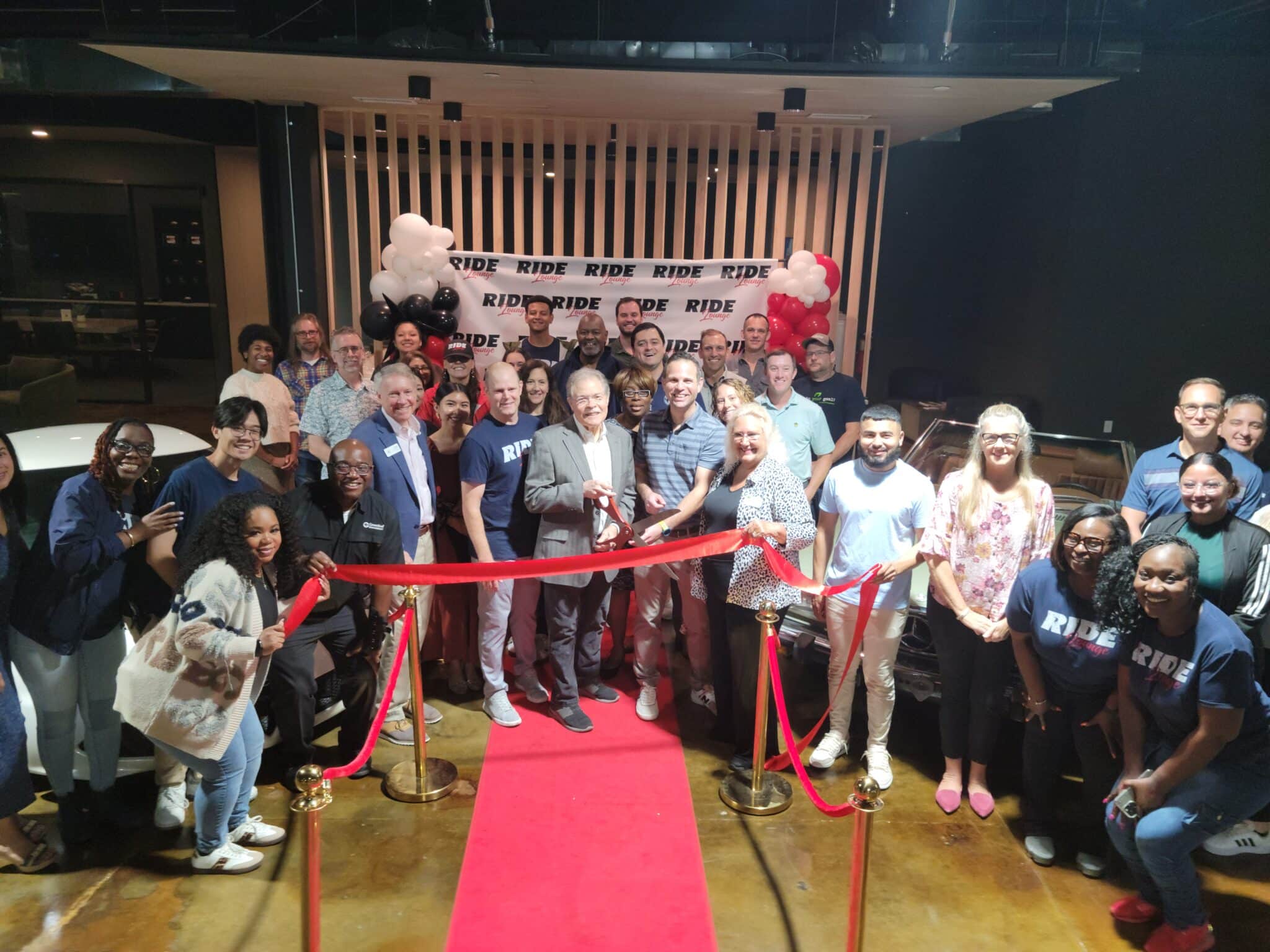
The Peachtree Corners Business Association and the City of Peachtree Corners officially welcomed Ride Lounge, one of the city’s newest businesses, with a morning ribbon cutting ceremony on May 29.
From 9 a.m. to 10:30 a.m., members of the city and PCBA, along with members of the community, enjoyed mingling, getting to know the Ride Lounge staff and learning more about the unique company.
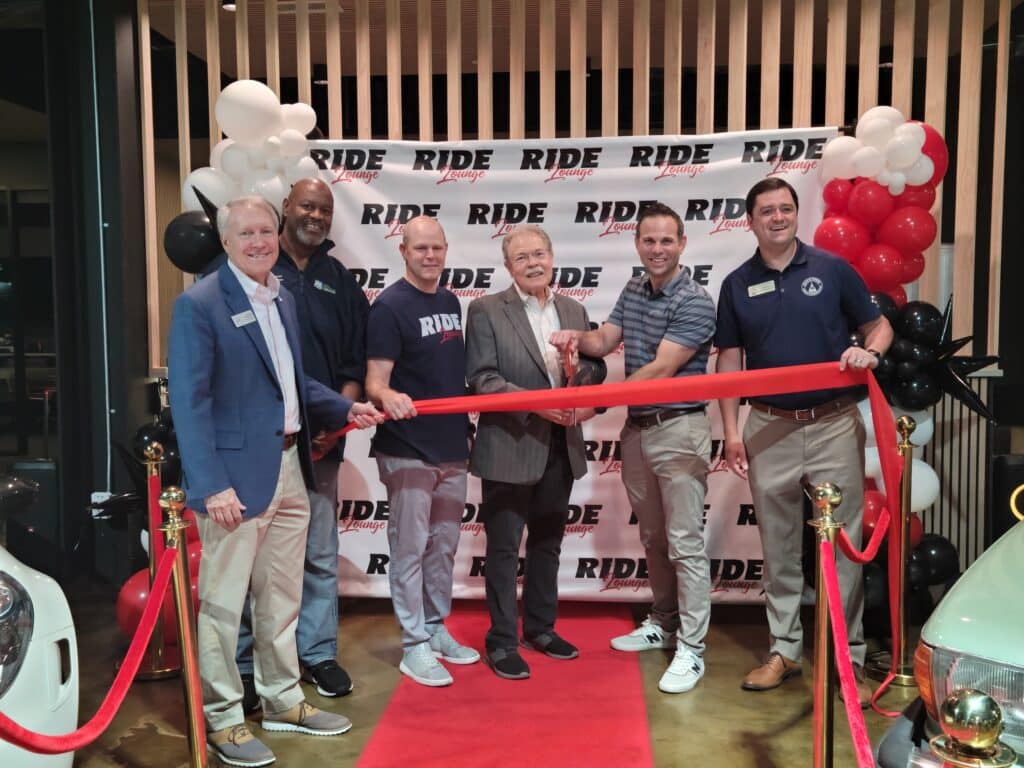
Guests also enjoyed a light breakfast spread of bagels, fresh fruit, coffee and juice and brief speeches from featured guests.
Welcoming the business
Lisa Procter from the PCBA spoke first and thanked Ride Lounge for being part of the PCBA and the Peachtree Corners community. She also recognized the collaboration between the organization and Ride Lounge in hosting the ribbon cutting.
“The PCBA was proud to coordinate with Ride Lounge and the community to make this event a success,” Procter shared.
Mayor Mike Mason followed Procter in addressing the crowd and talked about the state of business in Peachtree Corners and how companies like Ride Lounge help make the city a great place to live and work.
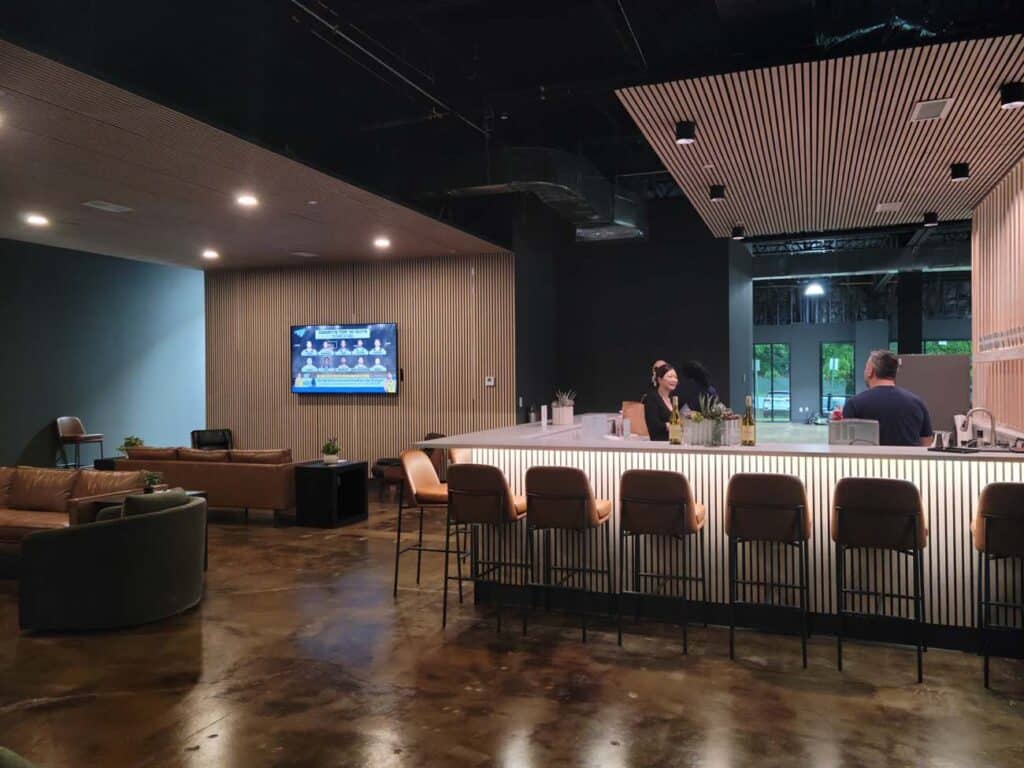
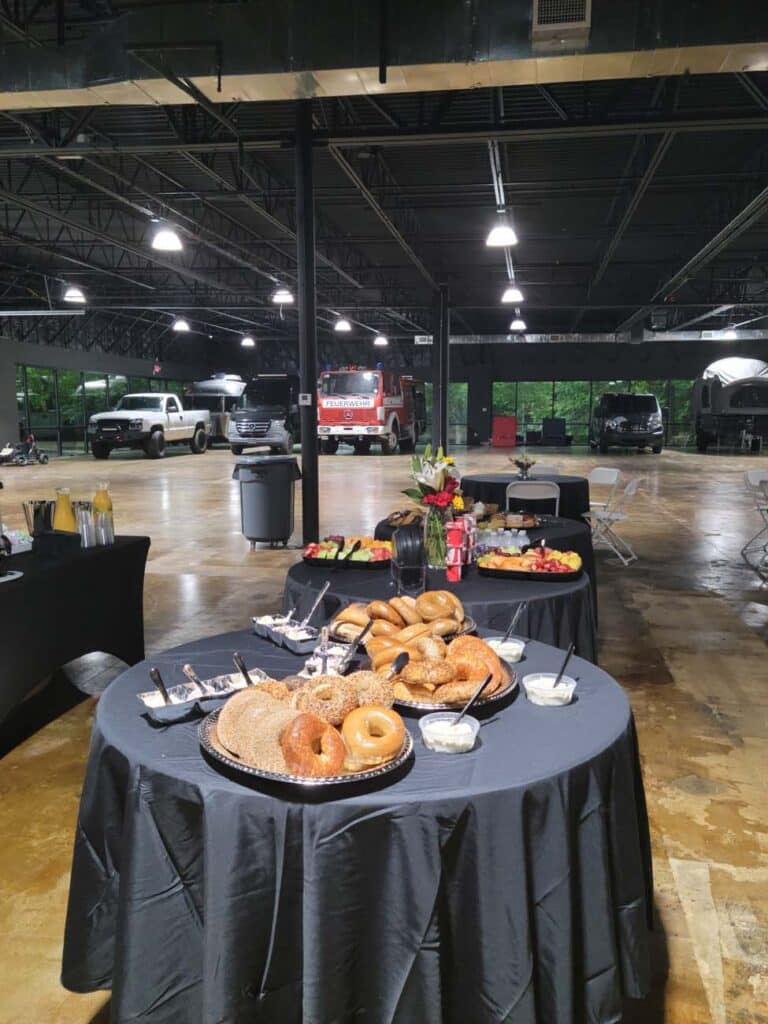
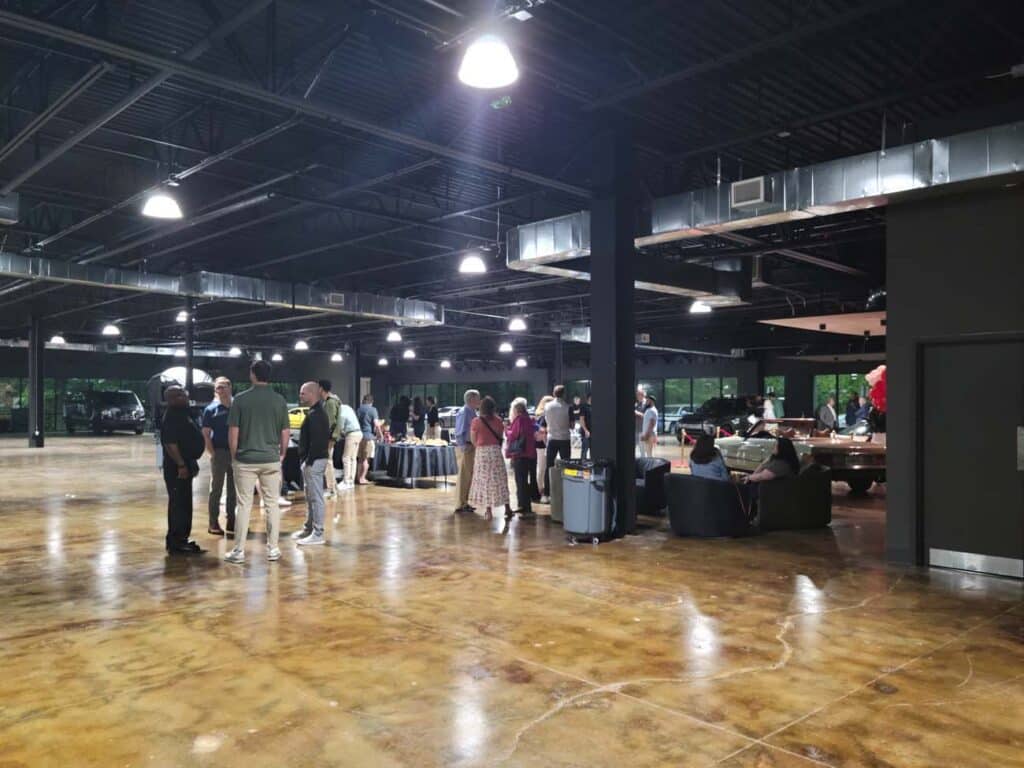

Dave Codrea and Josh Friedensohn, founders of Ride Lounge, then thanked everyone for coming and shared a little about the company and their vision.
The cutting of the ribbon and photos followed the brief speeches. Afterwards, the crowd was invited to tour the space and spend more time chatting and networking.
About Ride Lounge
The Ride Lounge is more than a car storage facility, it’s a place that celebrates car culture; where car enthusiasts can meet to discuss their passion and show off their vehicles.
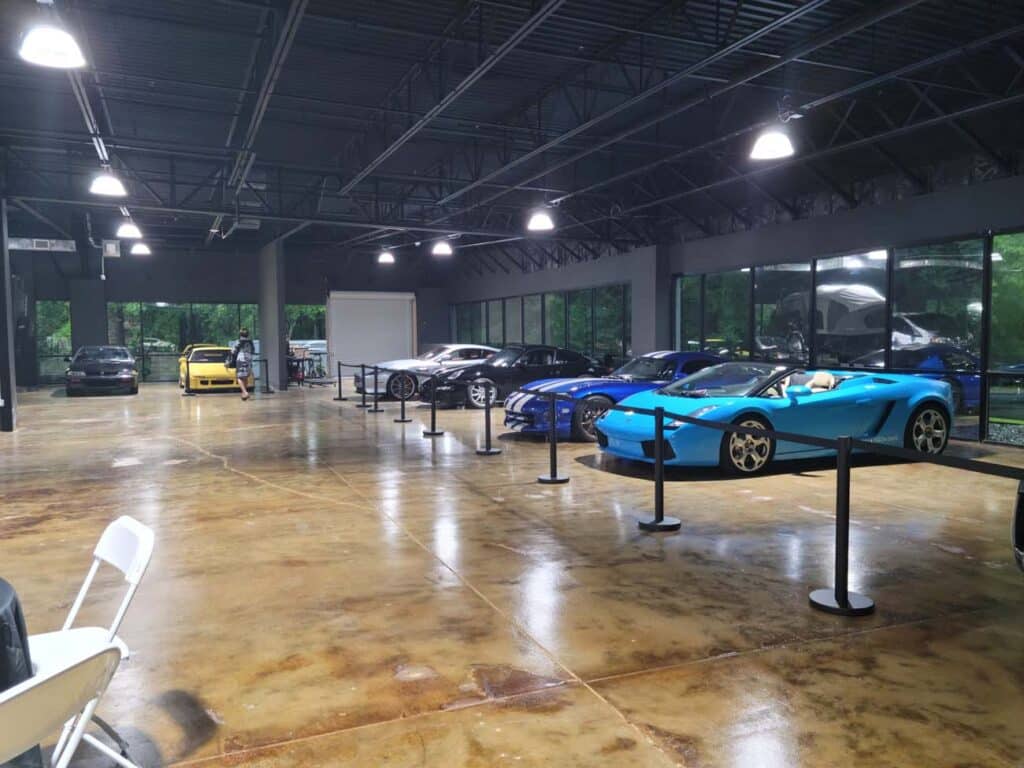
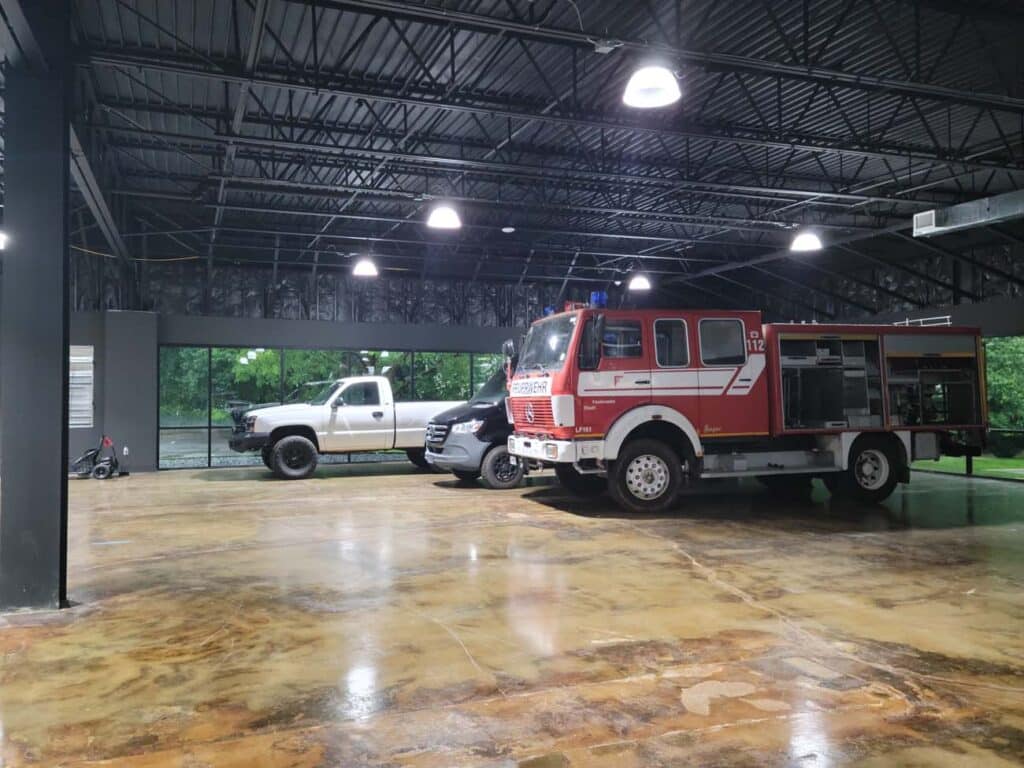
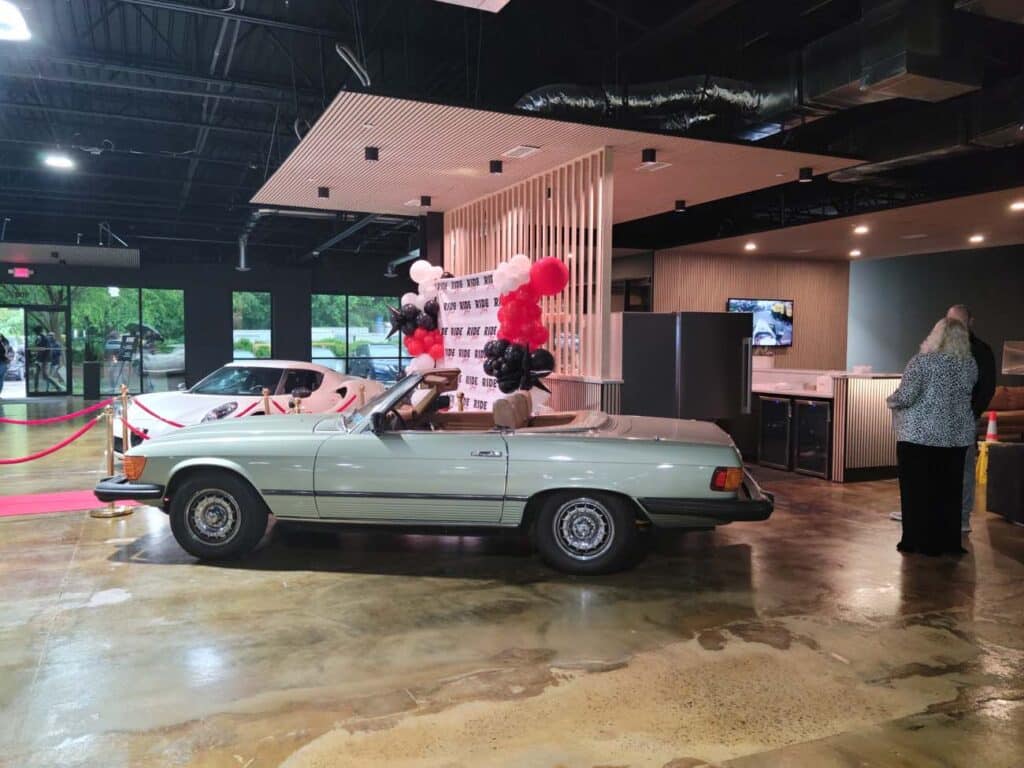
Founders Dave and Josh wanted to create a welcoming community that people would trust to store their vehicles, but that would also offer a club-like atmosphere and host fun, car-centered events that the whole family could enjoy.
Ride Lounge’s 20,300-square-foot facility is comprised of 58 parking spaces with the potential to include car lifts in certain areas. There are cozy seating areas, a meeting space and kitchen area so members can hang out, relax and talk cars.

Designed for cars that are driven and enjoyed by families, Ride Lounge has room to hold up to 400 people for special events and activities.
To learn more about Ride Lounge, visit ride-lounge.com.
For more about the PCBA, visit peachtreecornersba.com.
Related
Business
Music Matters Productions Expands Peachtree Corners Headquarters
Published
2 weeks agoon
May 21, 2025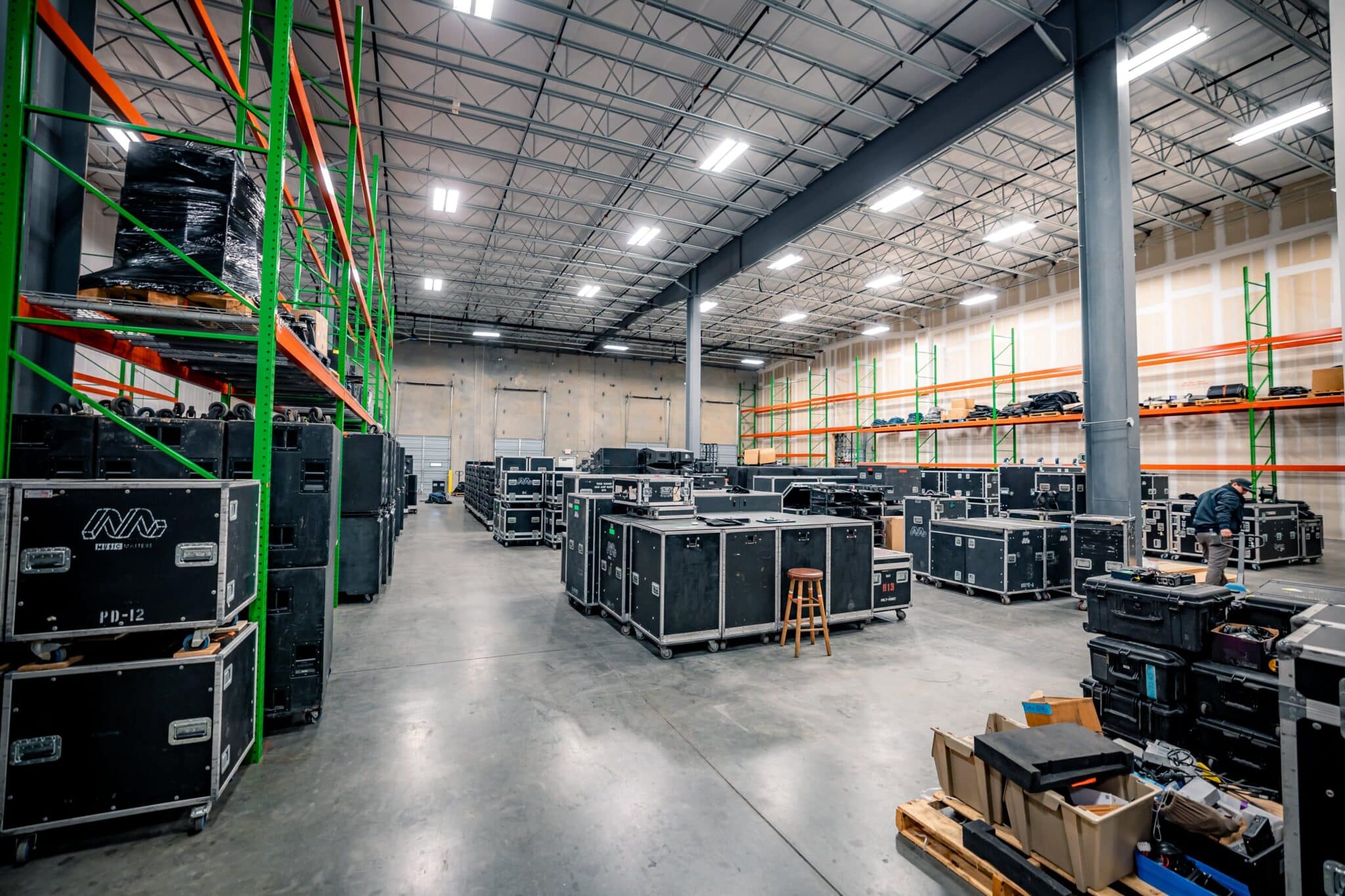
Company adds 20,000 square feet to meet growing demand
Music Matters Productions (MMP), a premier provider of audio, lighting, video, staging and rigging solutions, has expanded its metro Atlanta headquarters, increasing the total warehouse footprint from 40,000 to 60,000 square feet.
In addition, MMP has opened a second 10,000-square-foot building directly across the street to house its growing corporate production division.
The expansion comes in response to increased demand across touring, festival and corporate markets, as well as the continued growth of MMP’s high-end gear inventory. With a fully dedicated shop for each department, including audio, lighting, video, rigging and staging, the new layout provides more space for show prep, pre-rigging and crew coordination, allowing for even more efficient load-ins and streamlined execution.
New features
The rigging department now features a new mobile motor hoist test stand, allowing for in-house motor certification, a service that’s now available to external clients in the production community.
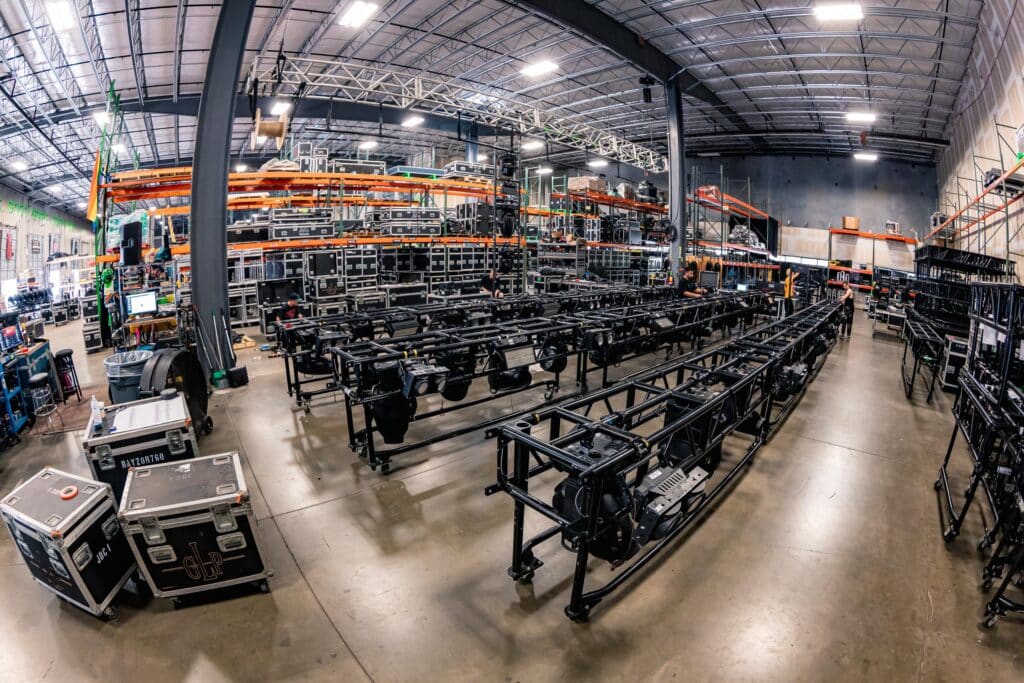
Five new truck bays were added in the process, as well, bringing the total number of bays to 17 — an important upgrade for MMP’s fleet and the increasing number of shows moving through the warehouse each week.
“This growth is a direct reflection of the work our team puts in and the trust our clients place in us,” said Aaron Soriero, owner of Music Matters Productions. “We didn’t expand for the sake of being bigger, we expanded because we needed the space to do the job right. More room means tighter prep, faster turns and better support for our clients.”
Expanding operations
The expanded warehouse and building across the street include additional offices, mixed-use areas and a dedicated repairs department, giving the team more capacity to prep, collaborate, QC and scale for increasingly complex events — both corporate and entertainment.
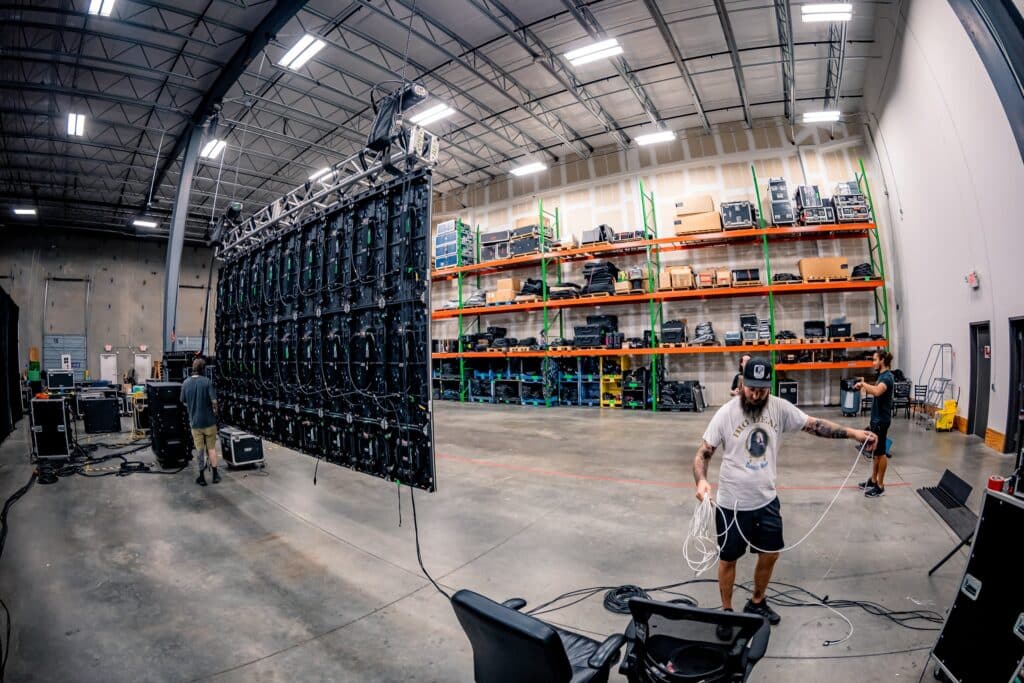
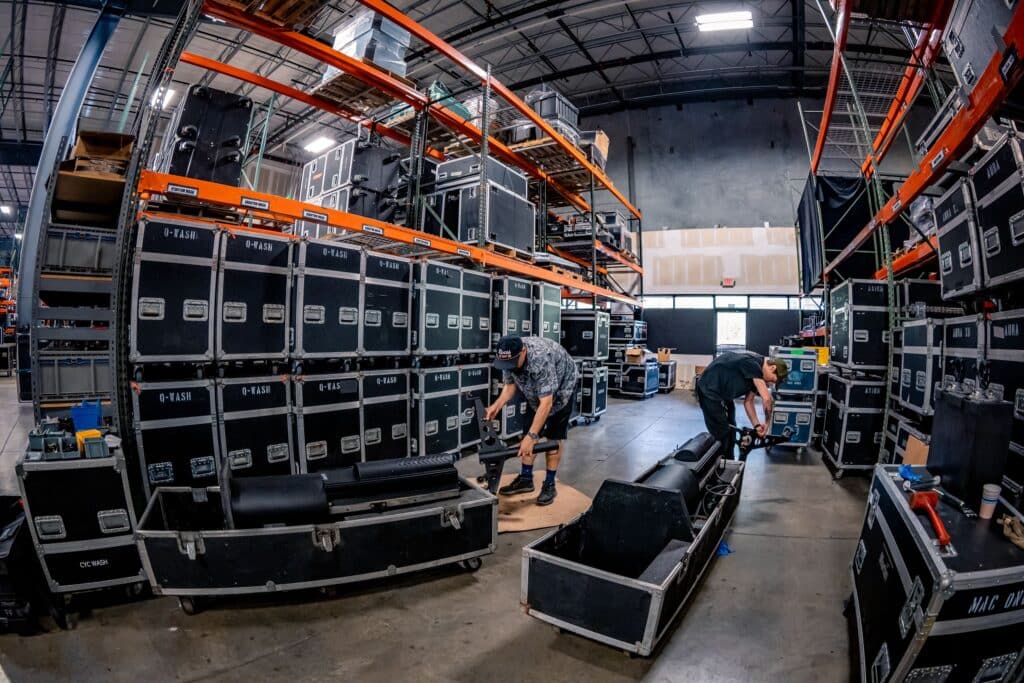
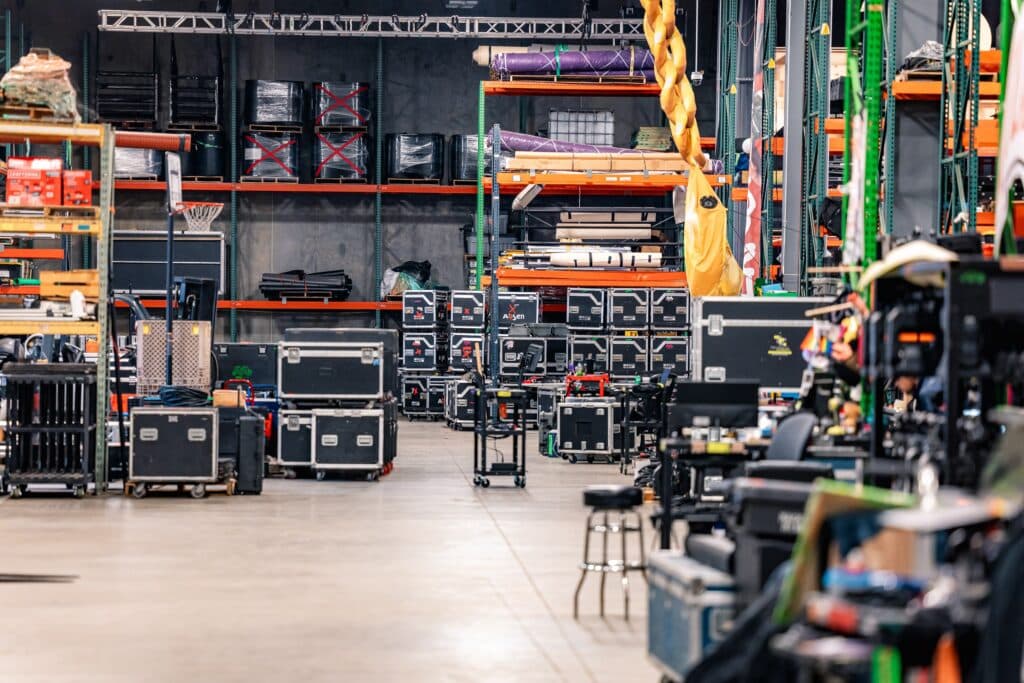
With a reputation built on reliable gear, experienced crews and an enhanced client experience, MMP continues to solidify its role as a go-to production partner for events of every size and setting — whether it’s a beachside festival, a stadium tour, brand activation or a high-stakes corporate show.
About Music Matters Productions
Music Matters Productions is a full-service live event production company based in Peachtree Corners, Georgia, providing industry-leading audio, lighting, video, rigging and staging solutions for tours, festivals, brand activations and corporate events across the country.
Known for its high-end inventory, seasoned crew and deep dedication to doing the job right, MMP supports hundreds of productions each year and is trusted by clients nationwide.
For more information, visit mmp-atl.com.
Related
Business
From Boardrooms to the Himalayas: Vandana’s Journey to Purpose and Growing with Intention [Podcast]
Published
2 weeks agoon
May 19, 2025
How one family blends operational clarity, conscious leadership, and community-driven values to grow their business — together.
In this episode of UrbanEbb, host Rico Figliolini chats with Vandana Aggarwal, VP of Operations at Aggarwal Real Estate, about the winding road from global consulting to family-run commercial real estate in Norcross, Georgia. With honesty, warmth and insight, V shares how she went from working 80-hour weeks in corporate strategy to rediscovering clarity in the mountains of India — ultimately helping transform her family’s business into a community-driven real estate firm managing over 50 shopping centers.
The conversation weaves together themes of leadership, legacy, operational excellence and the transformative power of both AI and yoga. It’s a story about clarity, courage and conscious growth — both in business and in life. This is another episode you won’t want to miss.
Episode Highlights
- Why Vandana left a high-powered consulting career to join her family business
- How hiking Kilimanjaro and studying yoga in the Himalayas changed her leadership mindset
- The operational overhaul she brought to Aggarwal Real Estate to support growth
- What it’s like working side-by-side with your dad, siblings, and 700+ tenants
- How the company rebranded with intention and built a mission around “building communities as a community”
- Where AI is reshaping real estate—from lease drafting to property management—and where it still can’t compete with people
- Leadership succession planning with siblings at the helm
- The importance of clarity, calm, and conscious growth in both business and life








About Vandana Aggarwal
Vandana Aggarwal is the Vice President of Operations at Aggarwal Real Estate, her family’s commercial real estate investment and management firm. She brings a unique blend of strategic insight and operational excellence, shaped by her early career as a consultant at A.T. Kearney, where she advised Fortune 100 to 500 companies. A graduate of Georgia Tech, she also took a transformative detour from the corporate world to spend a year in India teaching yoga—an experience that continues to influence her leadership style today. At the core of her work is a deep commitment to family and a passion for building strong, connected communities.
Timestamp:
00:00:00 – Introduction and sponsors: Vox Pop Uli & EV Remodeling
00:03:12 – From Georgia Tech to global consulting
00:04:23 – Leading strategy for Fortune 500 companies
00:06:11 – The role of vision alignment at the C-suite
00:08:01 – Sabbatical becomes family business overhaul
00:09:35 – Bringing operational excellence to a growing real estate firm
00:12:02 – A year of yoga, nature, and healing in India
00:17:03 – Hiking Kilimanjaro, testing limits, and expanding self-trust
00:18:52 – Navigating family dynamics inside a business
00:21:56 – Planning for leadership transition: siblings, strategy, succession
00:24:06 – Rebranding the business: from American Management to Aggarwal Real Estate
00:26:33 – Where AI fits (and doesn’t) in real estate operations
00:30:04 – Legal, leasing, HR, and marketing efficiency with tech
00:31:01 – Community-focused retail and experiential shopping centers
00:32:00 – Reflections on AI, journalism, and digital trust
00:32:57 – Closing thoughts
Podcast Transcript
00:00:00 – Rico Figliolini
Hi, everyone. This is Rico Figliolini, host of UrbanEbb. This podcast comes out of the city of Peachtree Corners, and we have a special guest today. And if I don’t mess up the name, it’s Vandana Aggarwal.
00:00:15 – Vandana Aggarwal
Absolutely. You can call me V, Rico.
00:00:15 – Rico Figliolini
I’m going to call you V, trust me. And I’m Rico Figliolini, so a bit of a long name there. But V is VP of Operations of Aggarwal Real Estate here, based in Peachtree Corners? No, Norcross.
00:00:30 – Vandana Aggarwal
In Norcross, yeah. Norcross, Georgia.
00:00:32 – Rico Figliolini
Yeah, yeah. Just off 85, and?
00:00:34 – Vandana Aggarwal
Jimmy Carter.
00:00:35 – Rico Figliolini
And Jimmy Carter.
00:00:36 – Vandana Aggarwal
We’re completing each other’s sentences already.
00:00:39 – Rico Figliolini
But where are we doing this? We’re doing this from one of our great sponsors, one of our two great sponsors, Vox Pop Uli. Was this tastefully obnoxious? Let me tell you, I asked them to do a corner cut for us, and this is perfect. So they have the Moxie logo and stuff. So they’re branding, right? Same way they can brand your stuff. They’ll put your logo on anything. They’ve done, I think, 6,000 vehicle wraps. They’ve done garments, obviously. They could do one-offs or they could do 1,000. They do trade show booths, wraps, everything. So anything you need a logo on, think of what object you want it on. They’ll figure it out for you. And if you’re doing, let’s say, 5,000 mailers and you want that database customized for each postcard, they could do that also. It’s called data. I forget what it’s called, but they can do that. They can work the data into the printing as well. So all customizable. Check them out, voxpopuli.com. Now, getting to something we were talking about, hands-on stuff, which is this also. This can’t just be done by machines, right? Although machines, you still need people. But EV Remodeling Inc., they are a remodeling company. They can do design to build. They can do whole house renovation. They can create your deck, your backyard gazebo. They can put a bathroom, kitchen, anything you want. EV Remodeling Inc. is owned by Eli and his family. Lives in Peachtree Corners. It’s based out of our city. They’ve done, I think, over 250 homes recently. So check them out, evremodelinginc.com. And I want to thank both of them for being great sponsors of ours. So, it’s always a long stretch doing that, but I’m glad to have you, V.
00:02:22 – Vandana Aggarwal
I’m happy to be here. Thank you for inviting me onto your podcast. Excited to chat with you.
00:02:25 – Rico Figliolini
Yeah, no, this is cool. Well, you know, I met you, where did I meet you at? I think it was the chamber.
00:02:30 – Vandana Aggarwal
Yeah, the Southwest Gwinnett Chamber event.
00:02:32 – Rico Figliolini
Yeah, and we were talking a bit, and I was like, damn, you know, I had my father owned a business, and he wanted his kids to be in it. None of us, none of us could go into that business. It’s a little difficult, different industry. It was a hard industry, plus my father was very patriarchal, very over-demanding. God bless him. He mellowed in age. But when you were telling me about your family, I mean, your father, your mother, your sister, your brother, and you, I mean, all in it. It’s amazing.
00:02:55 – Vandana Aggarwal
We’re all together. We’re the modern-day Brady Bunch.
00:03:03 – Rico Figliolini
I love it. Yes, that’s exactly it. But, let’s start a little bit. I mean, you were telling me, I mean, you came from a consulting world. You came where you were actually being paid a lot more than you’re being paid right now, actually.
00:03:12 – Vandana Aggarwal
I told my father he couldn’t afford me when he recruited me out. So I graduated from Georgia Tech in 2007. I actually did join his company right out of college for two years, learned a lot about the company. He actually had me go through a rotation in every department of the company to learn more about what we did, how we operated. And I think very quickly, it was also 2008-9 with a recession. But I was also very interested to learn how big companies operate. How can you take a small company at that time? We were much smaller than we are today and really understand how do you go from this, which is where everyone starts, right? As a new company to get to be one of the largest in the nation, in the world and see how they operate, how they grew it from, you know, a mom and pop business to this global enterprise. Consulting was a natural transition to learn about multiple companies, multiple industries. So transitioned into AT Kearney, which has now been rebranded as Kearney, and out of their Chicago office. So I was there for seven to eight years, almost eight years.
00:04:23 – Rico Figliolini
Entry-level position you got in?
00:04:24 – Vandana Aggarwal
Yeah, I went in as an analyst. The good thing with that experience was by the time I left, I was a senior manager with Kearney. I worked across 17 different companies in those eight years. So I got to experience how CPG companies, retail companies, transportation, IT, you name it, I’ve done it. In terms of the different types of industries I got to work with, worked with a lot of Fortune 100 to 500 companies at the C-suite level. So we were coming up with all kinds of strategy projects such as new market entries, mergers and acquisitions. A lot of what I ended up specializing in in those seven years was operational efficiency and growth strategy. So it was an amazing, I’m grateful for that learning experience, the you know the caliber of minds that you work with. You also get to experience what the C-suite looks like. How does the very top operate and then it goes from the top down right? So it is very much led at this very top leadership and you see how companies change in their culture the way they operate based on how the top is designed.
00:05:38 – Rico Figliolini
So did you see good and bad at the top?
00:05:41 – Vandana Aggarwal
Absolutely. And I’m not going to name names. But you learn a lot when you see how your CEO and your C-suite right below them, the culture they’re bringing into a company and their vision and their goals if they’re aligned, unaligned. Anyone that at the very top have different viewpoints of where the company has had it is where companies start to break apart, lose revenue, lose their you know people, which is very important.
00:06:11 – Rico Figliolini
Where did you see the pain point then? What was the common denominator I guess of those?
00:06:18 – Vandana Aggarwal
There’s no one common denominator, but if I had to kind of narrow in, it comes down to what is our five-year, ten-year trajectory? Where are we headed? As large companies grow, you’re not just in one industry. You’re not just doing retail shopping centers. You’re investing in all kinds of properties just to bring it back to our company. Similarly, a CPG company can make all kinds of products, so they have to decide what it is because you have to be concentrated on the right places. If you have a leadership team that is in alignment of what that ultimate goal is, right, then you have clear strategies and, you know, metrics you’re measuring your success against. So that was a big thing that I learned. Also just, you know, seeing how great leaders operate, right? Some of the best in the nation today, I got to be in the room with them and just to see how they lead is very important.
00:07:14 – Rico Figliolini
Did you see any family dynamics in any of those businesses?
00:07:20 – Vandana Aggarwal
No. You know, there may have been like a father-son duo, but when you’re looking at the very top, I won’t say it was like all in the family, right? You know, and it also becomes the size of a company, right? You know, when you get to an international scale, you’re not always blessed that every person in your family has the right skill set and experience to fill each role on that C-suite.
00:07:46 – Rico Figliolini
I’m just thinking Trump for some reason. Every kid has a job.
00:07:51 – Vandana Aggarwal
Every kid has a job.
00:07:52 – Vandana Aggarwal
You had the accent, right?
00:07:54 – Rico Figliolini
Pretty much, I guess. So after the C-suite or expansion, you traveled a lot too, I think, right?
00:08:01 – Vandana Aggarwal
I did, yeah. So after my seven, eight years in consulting, I was reaching 30. And Shiv, my father, came to me and he said, you know, you’re doing this for a lot of outside companies. Why don’t you help us grow and bring your expertise home? And I said, look, I’ll take a sabbatical. Let me assess the company. And after that period where I took a short sabbatical to come look at how we were operating, I said, I can give you three years. I said, you can’t afford me, but I’ll give you three years of my time. And I said, I think it’ll be the right, it was the right time in the company. We were investing very heavily. We were bringing in a lot of new square footage into the company, and we weren’t designed to manage it. So we as a company, as you know, we are the investors. We have an in-house management company, an in-house leasing company. So as we acquire new properties, our team does the management for those properties in-house. We don’t provide third-party services today. And we do the leasing in-house. But at that time, when he, you know Shiv started we had one or two and now we’re at 50 shopping centers plus and other investments that we have. And there’s a very different way you operate you know and how do you how does the CEO go from being an operator to where he’s overseeing it, but he’s not into the weeds right? So he has create a system for that to happen right? You have to have standard operating processes for your property managers, your accounting team, your marketing team.
00:09:35 – Rico Figliolini
And you quite didn’t have that before.
00:09:37 – Vandana Aggarwal
We didn’t, no. And, you know, and I think that’s why he wanted to bring me in is because my strength is operations and I love it. I love going into messy places and cleaning them up.
00:09:49 – Rico Figliolini
Is that what you did when you were a consultant?
00:09:51 – Vandana Aggarwal
A lot of what I was concentrating on at the end of my consulting career, yes. So I did a lot of operational efficiency work. So we’d go in, assess the way companies were designed. And we’d interview hundreds of team members to understand what their role is. You know, what are they responsible for? How are they delivering? What are they measuring for success? And then we’d redesign the way they did that based on, again, bottom line, what are your ultimate goals for the company?
00:10:21 – Rico Figliolini
So you had to understand that before you got to that point. And you’re not making the decisions, the C-level.
00:10:29 – Vandana Aggarwal
Present, right? And similarly even with Shiv, when I first joined, I said, look, this is how I think we need to redesign the company from a bottoms-up perspective based on ultimately our goal of growth, doubling, tripling in size over the next ten years. And I think this is where the father dynamic came in. I guess he trusted me. And he said, do it. He just said, do it. And it was beautiful because right when you’re with large companies, it’s a lot of time before you get. Those decisions made and that trust, right? And so it was great. And he said, yeah, just put it into place.
00:11:07 – Rico Figliolini
See, that’s a great dad, actually. Some dads would be like, I don’t know about that daughter or son or whatever.
00:11:16 – Vandana Aggarwal
It did take time, though, like to ultimately, he was in the operation so heavily. And, you know, until today, I’m still like, step up, step up. Like, I need you to not get into the weeds. Like I think at that time we had tenants calling him, maintenance guys calling him. Like every little and big problem would go through his cell phone. I said, you’re too smart and you’re such a good investor. This is not your skill set. You shouldn’t be managing this. You need to bring people on who are expertise in this area. And I said, you need to be focused on like the larger plan.
00:11:51 – Rico Figliolini
This way you can grow it better.
00:11:51 – Vandana Aggarwal
Which I think has been very successful over the last eight years I’ve been with him now.
00:11:57 – Rico Figliolini
So before you got to him, though, you were traveling a bit internationally as well?
00:12:02 – Vandana Aggarwal
Yeah, yeah. So this is an amazing year. I was very burnt out. By the time I left consulting, I was working 70 to 80-hour weeks, traveling Monday through Thursday, if not more than that, of the week. So I told Shiv, I was like, I’m going to take a month. I’m going to go to India, get my yoga certification. No intention to teach at the time. I just said it’d be a great one-month retreat. And I was up in the mountains like Himalayas and India in a city called Dharamshala. Beautiful place. One of my favorites in the world. And I just, I think I needed it for myself emotionally, mentally to take that break. So I turned one month into one year. I didn’t know it was going to be a year.
00:12:49 – Rico Figliolini
In that same city? In that same town?
00:12:50 – Vandana Aggarwal
Yeah, so I ended up the school that I had gotten my certification with. I asked them, I was like, do you mind if I hang around for a little while? Like very casually, I’m like, you know, I’ll pay for my room and board, but I just want to be around this group and this energy. And they said, well, if you’re going to be here, why don’t you intern? And they’re like, room and board is free if you intern. I was like, sure. You know, not thinking what it was leading to. This is like that beauty of the universe coming into play. Yeah, so I started teaching, ended up loving teaching. So then I ended up teaching the 200-hour yoga training course. And I was in Dharamshala for four months. And then I moved down to Goa, their Goa campus for another six.
00:13:30 – Rico Figliolini
Where is that? Goa?
00:13:32 – Vandana Aggarwal
Goa? It’s in southern India on their west coast. It’s a beach town. Yeah. So I had the mountains and the beach. But I’m a mountain girl. I’m a hiker. But no, it was a beautiful experience. Very different from anything I’ve done with my career, right? But I became a yoga teacher for a year.
00:13:52 – Rico Figliolini
Did that clear your head? Yoga, they say, can do that, right?
00:13:53 – Vandana Aggarwal
Yeah, it’s all the tools of yoga, right? The meditation, the breath work, really getting internal, going in, right? Just going inwards, being quiet, which we don’t have. We have a lot of noise in our life today, you know? And naturally, right? Between family life, work life, social, and then just all of the noise from everything else right? Like we’re sitting here and I can hear the cars right? So you know that difference was when I was sitting there, I could hear the ocean waves and so there’s something very healing in nature naturally. So it was the tools mixed with nature and I still think nature has a very strong healing power on us. So whenever I can, I try to get out on a mountain and by the ocean. But yeah no it was it was a beautiful experience but it did bring a level of calmness into the way I approach things. It changes your perspective of you know at the end everything’s okay. No matter what you’re going through it’s temporary you’re, and everything that’s happening to us is happening to us for the good. We don’t know it, sometimes it seems like a bad situation in the moment, but ultimately you know, universe, God, whatever you believe in is at play to bring you something better in your life. And you just have to step back to understand what is it delivering us.
00:15:19 – Rico Figliolini
I like the way you think. My wife every once in a while would say, aren’t you upset about that? I’m like, I think come tomorrow, it won’t mean anything. There’s no point in, just relax. Not everything, two days later, it’s not as important as it seemed at that moment.
00:15:37 – Vandana Aggarwal
Yeah. And it’s not just that it’s not as important. It’s also like…
00:15:41 – Rico Figliolini
In perspective?
00:15:42 – Vandana Aggarwal
It’s, what am I gaining from this? Like, what can I gain from this? Oftentimes when, you know, a lot of things happen, yeah, like you get hurt or, you know, it’s like in relationships, right? Or if you have a bad business deal, right? It’s like, hey, how am I growing, right? And I think that’s what makes life very exciting, right? Otherwise, if you’re always living on a high, is it a high?
00:16:06 – Rico Figliolini
Yes. So I’m thinking you were a consultant for seven or eight years. 80 hours a week. And all of a sudden you’re doing yoga on the mountains of India. It’s just like, it’s almost like a movie. It’s almost like…
00:16:18 – Vandana Aggarwal
Eat, pray, love?
00:16:19 – Rico Figliolini
Yes.
00:16:20 – Vandana Aggarwal
It was my eat, pray, love moment for a year.
00:16:23 – Rico Figliolini
That’s amazing.
00:16:24 – Vandana Aggarwal
No, you meet amazing people, but I think we were meant to meet everyone that we come in interaction with on a daily basis. You naturally have a connection. There’s a universe at play, and we were meant to cross paths and learn something from each other, gain something from one another, give to the other person. And I think you just have to look at life that way.
00:16:48 – Rico Figliolini
I definitely think along that way. I mean, I definitely think each of us nudges each other in a crowd a little bit. That one nudge can set you off going in a different direction. So I totally believe in that. So you joined your dad. Yes. And you’re, so actually, even before we get there, so yoga, but what other interests have you been?
00:17:03 – Vandana Aggarwal
Yeah. So, I mean, I’m an avid hiker. I’ve done recently in the last few years, I’ve climbed Kilimanjaro. I did the Machu Picchu trail. I’ve done a few 14ers out in Colorado, but I like to test myself physically. You know, just, again, it comes down to how do we find that push within us past our comfort zone? So is this a physical inability or is it a mental constraint? So to get past that mental constraint of discomfort and then really push yourself to the next level and say, I can achieve something. It’s not going to be easy. So to me, if I’m on a hike and it’s not hard, I’m like, well, was it a hike? Like it didn’t test me, but no I think, you know.
00:17:55 – Rico Figliolini
You should do the Appalachian Trail. That’s like 2000 plus miles.
00:18:03 – Vandana Aggarwal
I know. And it is, you know, it’s not just like the hiking part. It is like living out in nature and, you know, sleeping in uncomfortable conditions. Yeah. Walking in the rain. It’s cold. I think the last day of our Kilimanjaro hike, it was negative 20 degrees up in the mountain and my eyelashes were frozen and I couldn’t feel any part of my body. And, you know, and it tested my breathing. And there is that element of push yourself to the point that it’s not your ego anymore. Like if your body’s saying stop, you have to stop as well and respect your body. But yeah, to really test yourself.
00:18:38 – Rico Figliolini
To circle all that back now, you’re back home. You’re working with your father and your family. A lot of businesses grow or die because of family. If it’s a family business, right?
00:18:52 – Vandana Aggarwal
Absolutely, yeah.
00:18:53 – Rico Figliolini
So you have your highs, your lows, your, sometimes you don’t get along. Sometimes decisions are split. People get upset with each other. So you’ve been at your highs and lows physically and mentally doing other things. Has that helped you in some ways? Not that you’re having a bad time with family. Because it sounds like you all fit just fine, like the Brady Bunch.
00:19:15 – Vandana Aggarwal
Let’s keep it that way. No, I mean, there’s multiple dynamics at play. It is a family business. My father is also my boss. My siblings are also my friends and my coworkers. And it’s about no matter how hard you try, you cannot separate those relationships. There is an interplay of all of it when you spend eight to nine hours a day together. But we all have, again, a common goal for the company. And then a common goal for our personal relationship. So when we sit down, we keep in mind that we like each other and we want to keep it that way. Like very simply put, that’s first and foremost for me especially. Even when Shiv had brought me in, he said, oh, can you manage everyone? And I said, I’ll manage everyone but my brother and sister. I said, you know, like I won’t jeopardize the relationship I have with them as a sibling by being their manager. Especially because I said that’s your job like good luck. But not just that it’s you know we all have different skill sets so I said how do I manage my brother who is a genius he’s a CPA by trade you know like I can’t tell him how to run the financials of this company like he’s supposed to teach me that right? And same way I teach him that. My sister has a master’s in marketing right? She is by far the most social, likable person you’re going to meet, and she knows how to work with people. I said, she needs to teach us that. So I think we’re lucky that each of us, and this is, I think, rare, where you have three kids and each one of them has their own skill set. That, I think, helps us stay in business and we see ourselves foreseeably into the long-term future being in business together is because we each bring something very unique to the table. Ultimately we value the relationships that we have on a personal level as a family above all else right? And then you know the element of like, how does the yoga experience a hiking experience teach us. That’s, it’s not specific to anyone’s situation, I think it’s a baseline of who you become right? The foundation. Like it teaches you patience, it teaches you again, everything is temporary so let’s not get overly attached emotionally or get upset or too joyful, even like, let’s just stay neutralized on any situation because it will end. And then the next one will come up and kind of flow with the ebbs and flows of the ocean. You, you flow with everything that comes with you, comes your way at work, at home. But yeah, I mean, we do sit down as a leadership team. I, my father and my siblings and I, and we talk about, hey, we separately do the exercise. Where are we going to be in five years? What role do we play in that journey? And thankfully, all of ours are very similar in what our goals are. And then we have different skill sets that we bring. So even as we design the future of the company in a moment where my father is not at the head of the table, we’re working on that redesign work. But it’s very conscious. It’s very intentional. Again, we all step back and say, hey, look, how do we maintain, how do we solve problems? Because like, you know, we were talking about how tomorrow we may not agree on something, a big decision. What are we investing in? Come back to, you know, right now Shiv gets to make an ultimate decision because he’s the one leader at the top. Tomorrow it’s going to be three people at the top. How do you deal?
00:23:04 – Rico Figliolini
So is there an exit plan for your dad? Well, not an exit plan.
00:23:09 – Vandana Aggarwal
Not an exit plan. He already has. I think he, you know, he’s gone from, he’s the hardest working person I know. I get that from him. We’re addicted to work.
00:23:18 – Rico Figliolini
80 hours a week.
00:23:21 – Vandana Aggarwal
We love working. You know, this company is his baby. I think I’ve adopted it at this point and we all have. But, to stay mentally sharp, to stay alive, you have to keep working. You have to keep doing something. You have to be working towards something that brings you joy and purpose. And I think, you know, he stepped back to take time towards a lot of his nonprofit work, community work that he’s very much engaged with. But he’s still at the top. He’s still running, you know, his, you know, he’s, you know, not slowing down. You know, we’re constantly growing. We’re growing this year in a large scale, which is amazing, and he’s leading that charge.
00:23:59 – Rico Figliolini
How many properties do you own?
00:24:02 – Vandana Aggarwall
Today we have 50 shopping centers and then a few other assets.
00:24:06 – Rico Figliolini
Is that like 3 million square feet or something? 4 million?
00:24:10 – Vandana Aggarwal
Yeah, over 700 tenants. But, you know, when we sat down a few years ago, we rebranded. Aggarwal Real Estate didn’t exist until two years ago. It was American Management Services. And we had a rebranding effort because we said we want the company’s name and the brand to represent who we are.
00:24:33 – Rico Figliolini
I like that, by the way.
00:24:35 – Vandana Aggarwal
Yeah, it needs to mean something. And we were also proud of what our father has achieved, right? He’s given us this beautiful life that we get to help grow upon. So we said it needs to pay homage to him. So we said, let’s make it Aggarwal Real Estate, ARE. And then as we were deciding what that vision is, we’re a family. In the company, we are a family, not just the four of us, but all of our staff, our team. We don’t, you know, we don’t look at them separate from who we are. And so we said our mission as a company is building communities as a community. And it talks about, hey, in all of the real estate work we’re doing, we try to make sure all of our properties are beautiful. Our tenants are happy. They have direct access to each of us in the company. And on top of that, as a company, we are a community within ourselves because we can’t create them until we are one. So it was very intentional to who we already were, but putting it into brand terms.
00:25:37 – Rico Figliolini
It’s amazing. All that property, tenants. Can’t imagine father tech can send text messages on all their problems, if they have any.
00:25:45 – Vandana Aggarwal
He’s a brilliant man.
00:25:45 – Rico Figliolini
You could be too possessed on that stuff. We want to be cognizant of our time together.
00:25:55 – Vandana Aggarwal
Absolutely.
00:25:57 – Rico Figliolini
So the next subject really was going to be about also AI, because everyone’s talking about AI. We were talking about that before the show started, before we started recording, which was kind of funny because V was asking me if we edit anything. And I was like, no, straight through.
00:26:11 – Vandana Aggarwal
I wanted to see if I could say a few things and then have it taken out of this conversation.
00:26:13 – Rico Figliolini
Nope. Nope. Doesn’t work that way. So, but ChatGPT, AI, that’s all. I mean, you know, could I create a bot to edit this? Probably. But there’s so many things we use in our lives. And you’ve been talking about how it would affect your business. Nevermind the consulting work you did.
00:26:33 – Vandana Aggarwal
Yeah. I mean, the consulting world is, I mean, it depends on the industry, the type of work you’re doing. In real estate, I’ve put a lot of thought behind this. There’s a lot of conversations happening across every industry, every sector, whether it’s education, automotives, real estate, et cetera. Everything’s being discussed. How is that changing the future? How do we incorporate it to be more efficient, right? Be the best in the industry that we can be or operate better. And so for me it’s again comes down to that operations element that I think about like, how do I incorporate it for a company that’s a medium-sized real estate firm today as we become a large company, a bigger player in the market. And people are very important in real estate right?
00:27:17 – Rico Figliolini
Talk about editing?
00:27:20 – Vandana Aggarwal
I was telling you, we should bring them into the podcast.
00:27:27 – Rico Figliolini
We’re going to run a little longer on this.
00:27:36 – Vandana Aggarwal
But let’s take retail shopping centers. This is brick and mortar. I did a paper actually for a large mall retailer back in my consulting days on how the title of the paper was, is brick and mortar dead? And, you know, full circle, I am fully dedicated to brick and mortar, retail, office, multifamily now. But you still need people to clean up your properties, fix your maintenance issues. We were talking about roofing, plumbing, electrical. That is hands-on work. You know, today there is, it’s going to be a long time before there’s a robot that comes in to do that. There will be. I don’t know. I do not see that in 10 years to say we’ve got roofers that are robotic drones that are going to come fix my roof problems.
00:28:24 – Rico Figliolini
Zumbas, they’re going to run around the roof or something.
00:28:26 – Vandana Aggarwal
That’s actually genius. A Zumba for my roof.
00:28:31 – Rico Figliolini
Why not? Attach it to the right thing.
00:28:33 – Vandana Aggarwal
But so those are very people-oriented roles today. Technology will advance how quickly it’s done or how well it’s done. But you’ll still need someone to operate the machinery of it and everything.
00:28:49 – Rico Figliolini
Just not as many.
00:28:50 – Vandana Aggarwal
Yeah. Construction, similarly, right?
00:28:54 – Rico Figliolini
Unless you 3D print a house. I’m sorry.
00:28:56 – Vandana Aggarwal
No, it’s true. It’s true. There’s so many options. I’m thinking 10 years now. I’m not going to have a 3D printer making the metal framing for my new construction project. You know, or installing the sheetrock, it does probably speed up the process, right? There will be machinery to help with that, a lot of AI development in that way. It’s a lot at an office administrative level, right? The speed in which you’re processing invoices, the speed in which you are, you know, getting payments taken in. Today, I would say as far back as right before COVID, we were still accepting checks for money. Now it’s all online. Like we do not accept money coming into the office, or it’s very limited to what we do, right? So that’s AI, if you think about it, right? The ability to pay online.
00:29:42 – Rico Figliolini
QuickBooks Online uses AI now, you can enable it.
00:29:47 – Vandana Aggarwal
So we’ve been using it for many years. The advancement of it has been a little bit slower, and now it’s sped up. Marketing, we were just talking about how you created a flyer on ChatGPT, was it?
00:30:00 – Rico Figliolini
I won’t talk about the student that’s helping us out here and how they use AI.
00:30:04 – Vandana Aggarwal
No, AI in school, right? But yeah, it’s an AI processor for my HR roles, right? Instead of reading 100 resumes, it’s going through the system to filter them out. Whether it’s writing contracts, I won’t lie. Legal jargon is coming out of ChatGPT today. And so it’s speeding up the way we’re doing work. But my legal team probably, and they won’t say it, should be using AI if they’re not. To help create some of this work right? So it’s like these companies are still going to be needed, but the way that they’re able to respond to us at a quicker, everything would just happen faster right? From typewriters to computers, everything.
00:30:49 – Rico Figliolini
Especially if they know that they just did a lease from you for this property in Texas, that we need three more leases done for three other places, it’s not going to be that much different, right? It’s a template.
00:31:01 – Vandana Aggarwal
It’s coming out a lot faster. Yeah, I mean the negotiations, that’s a people-to-people thing right? So I think thankfully in the real estate world we’re still going to need people. We’re still going to need buildings right? The way built, we were just talking about how a retail shopping center is no longer just for shopping. It has to be for entertainment. It has to be for bringing families in and giving them more than just, hey, go into a TJ Maxx and buy something, right? It’s like, what else are you getting when you’re at that center? Whether it’s a play space or events, we’re starting to do more events at our shopping centers. So it’s, again, serving the community.
00:31:39 – Rico Figliolini
We’re seeing that more. More of that happening. We could go on and on here.
00:31:46 – Vandana Aggarwal
Chatting with you.
00:31:46 – Rico Figliolini
Yeah, and we should probably do one on either AI in the marketplace. Or maybe a panel discussion on something similar.
00:31:51 – Vandana Aggarwal
Yeah, overall, yeah. That would be exciting.
00:31:55 – Rico Figliolini
Yeah, I think that would be cool.
00:31:56 – Vandana Aggarwal
I think it’s interesting to learn about kind of where every industry is heading. It impacts all of us.
00:32:00 – Rico Figliolini
For sure. I mean, the magazine business, I mean, it’s all like we have certain, we have AI rules. But, you know, AI is still being used to degree to research things. And to do certain things like that. You know, hopefully journalism isn’t just handed over. They do say 40% of the internet is AI written. So, which is kind of incestuous almost because it’ll just feed on itself at some point.
00:32:27 – Vandana Aggarwal
There’s a whole discussion about the validity and the trust behind digital content. In the next few years. I think it’s going to diminish.
00:32:35 – Rico Figliolini
Oh, yeah. I mean, I’m seeing videos now and it’s just like, it just looks so real. And you could not tell the difference, even voice-wise.
00:32:42 – Vandana Aggarwal
And that’s scary to think. It’s like, how do you trust what you see?
00:32:47 – Rico Figliolini
So on that note, and since this is not edited, so this is right from the beginning. So this is all true. But I want to thank everyone. I want to thank you, V, for being with me.
00:32:57 – Vandana Aggarwal
Thank you so much for having me. This was a great conversation.
00:33:01 – Rico Figliolini
It went by way faster than some of these go. So this is a great discussion. Thank you, everyone. I appreciate you for joining us. Thank you for Vox Pop Uli for the studio look and for letting us do it here, for being a sponsor and for EV Remodeling. Also, I want to thank Jeremy Pruitt behind the camera who has taken care. He’s a Paul Duke student. And it wasn’t him that I was talking about before, by the way. But all the work he’s done on the back end on this. So thank you, Jeremy. So thank you all. Thanks for being with us.
Related
Read the Digital Edition
Subscribe
Keep Up With Peachtree Corners News
Join our mailing list to receive the latest news and updates from our team.
You have Successfully Subscribed!

“Geek Culture” Shines at 2025 MomoCon

Vox-Pop-Uli Launches RED Initiative for Veterans’ Support

City Collaborates with DNR for Deer Overpopulation Solutions

The PCBA Awards $500 to Light Up The Corners at After-Hours Event

Peachtree Corners Festival Awards Debbie Mason Drama Scholarship for 2025

From Zero to Accredited: Dunwoody’s Billy Grogan on Starting a City Police Department [Podcast]

Mustache The Band Set to Play the VoxStage on June 14

The City and PCBA Welcome Ride Lounge with Ribbon Cutting Ceremony

More Than Badges: Why Community Culture Drives Great Policing [Podcast]

The City and PCBA Welcome Ride Lounge with Ribbon Cutting Ceremony

From Zero to Accredited: Dunwoody’s Billy Grogan on Starting a City Police Department [Podcast]

Mustache The Band Set to Play the VoxStage on June 14

City Collaborates with DNR for Deer Overpopulation Solutions

Peachtree Corners Festival Awards Debbie Mason Drama Scholarship for 2025

Vox-Pop-Uli Launches RED Initiative for Veterans’ Support

The PCBA Awards $500 to Light Up The Corners at After-Hours Event

Light up the Corners [Video]

Capitalist Sage: Business Leadership in Your Community [Podcast]

Cliff Bramble: A Culinary Adventure through Italy

Top 10 Brunch Places in Gwinnett County

A Hunger for Hospitality

THE CORNERS EPISODE 3 – BLAXICAN PART 1

Top 10 Indoor Things To Do This Winter

The ED Hour: What it takes to Remove Barriers from Education

Peachtree Corners Life
Topics and Categories
Trending
-
City of Peachtree Corners3 days ago
City Collaborates with DNR for Deer Overpopulation Solutions
-
Community3 days ago
Peachtree Corners Festival Awards Debbie Mason Drama Scholarship for 2025
-
Podcast1 day ago
From Zero to Accredited: Dunwoody’s Billy Grogan on Starting a City Police Department [Podcast]
-
Entertainment1 day ago
Mustache The Band Set to Play the VoxStage on June 14








